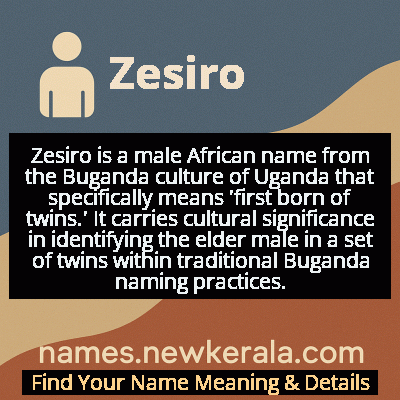Zesiro Name Meaning & Details
Origin, Popularity, Numerology Analysis & Name Meaning of Zesiro
Discover the origin, meaning, and cultural significance of the name ZESIRO. Delve into its historical roots and explore the lasting impact it has had on communities and traditions.
Name
Zesiro
Gender
Male
Origin
African
Lucky Number
2
Meaning of the Name - Zesiro
Zesiro is a male African name from the Buganda culture of Uganda that specifically means 'first born of twins.' It carries cultural significance in identifying the elder male in a set of twins within traditional Buganda naming practices.
Zesiro - Complete Numerology Analysis
Your Numerology Number
Based on Pythagorean Numerology System
Ruling Planet
Moon
Positive Nature
Diplomatic, friendly, artistic, empathetic.
Negative Traits
Over-sensitive, moody, indecisive, prone to self-pity.
Lucky Colours
Green, cream, white.
Lucky Days
Monday.
Lucky Stones
Pearl, moonstone.
Harmony Numbers
1, 3, 4.
Best Suited Professions
Diplomats, mediators, caregivers, artists.
What People Like About You
Cooperative spirit, friendliness, artistic talent.
Famous People Named Zesiro
Zesiro Kato
Traditional healer and cultural preservationist
Preserved Buganda twin birth rituals and traditions during colonial era
Zesiro Muwanga
Community leader and educator
Established first schools for twin children in central Uganda
Zesiro Nsubuga
Musician and cultural ambassador
Popularized traditional Buganda twin celebration music internationally
Name Variations & International Equivalents
Click on blue names to explore their detailed meanings. Gray names with will be available soon.
Cultural & Historical Significance
The cultural importance of Zesiro extends beyond mere identification, as the first-born twin traditionally assumes specific responsibilities within the family and community. In Buganda culture, Zesiro would be expected to participate in special ceremonies, inherit particular family roles, and maintain the spiritual connection believed to exist between twins. The name connects the bearer to centuries of Buganda heritage, where twins were thought to possess special powers and required careful integration into society through prescribed naming and upbringing practices that honored their dual nature while establishing clear hierarchy.
Extended Personality Analysis
Individuals bearing the name Zesiro are typically associated with leadership qualities, responsibility, and a natural protective instinct toward their siblings, particularly their twin. From early childhood, Zesiros often display maturity beyond their years, taking on guidance roles within family structures. This early development of leadership skills stems from both cultural expectations and the natural dynamics of being the first-born in a twin relationship. Many Zesiros develop strong decision-making abilities and a sense of duty that serves them well in both personal and professional contexts.
The unique position of being a first-born twin often creates a personality that balances authority with empathy. Zesiros frequently exhibit excellent mediation skills, understanding multiple perspectives while maintaining their leadership role. They tend to be reliable, family-oriented individuals who value tradition and cultural heritage. The dual nature of their identity as both an individual and part of a twin pair often results in people who are comfortable with both independence and deep connection, making them adaptable in various social situations while maintaining their core identity as natural leaders and protectors.
Modern Usage & Popularity
In contemporary times, Zesiro remains predominantly used within Buganda communities in Uganda, particularly among families who maintain strong connections to traditional cultural practices. While urbanization and modernization have led to some decline in strictly following traditional naming conventions, there's a notable resurgence among educated urban families seeking to preserve their cultural heritage. The name is almost exclusively given to first-born twin boys in accordance with its traditional meaning, maintaining its specific cultural context. Among the Ugandan diaspora, the name appears occasionally as families abroad make conscious efforts to maintain cultural connections through traditional naming practices. However, it remains relatively rare compared to more common Buganda names, with usage concentrated in central Uganda where Buganda cultural traditions remain strongest.
Symbolic & Spiritual Meanings
The name Zesiro carries rich symbolic meaning that extends beyond its literal translation. It represents the concept of 'first among equals,' symbolizing leadership within a context of shared identity and mutual dependence. The name embodies the balance between individuality and connection, as the first-born twin must navigate being both a distinct person and part of a special pair. Symbolically, Zesiro represents guidance, protection, and the responsibility that comes with being first while maintaining the essential bond of twinning. This symbolism extends to representing harmony in relationships, the importance of traditional family structures, and the cultural value placed on both hierarchy and equality within special relationships. The name serves as a metaphor for complementary leadership and the idea that true strength often comes from understanding one's position within a larger context.

